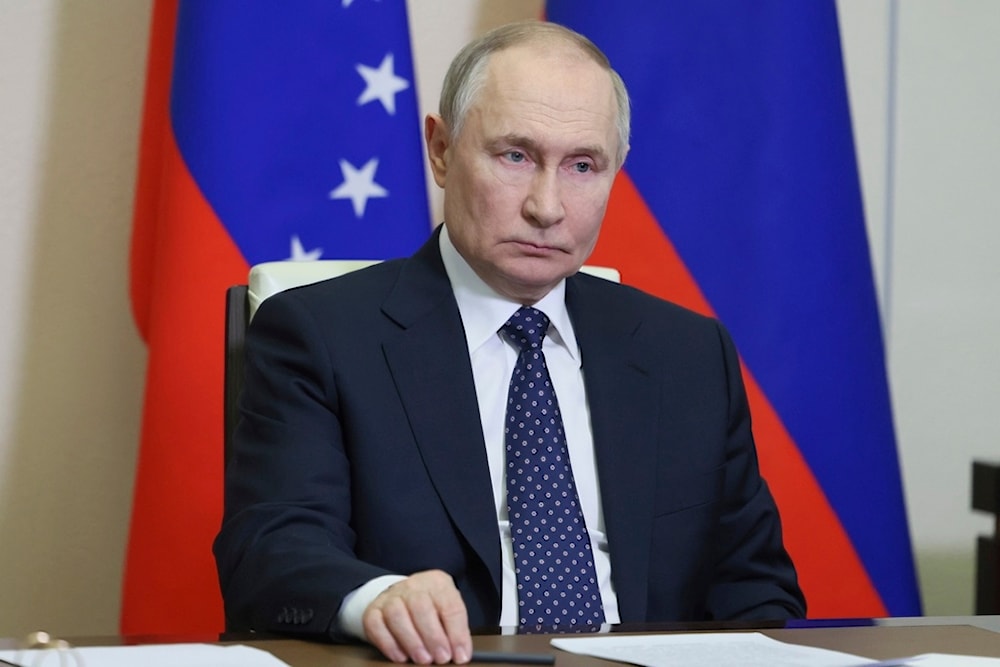Russia's Oreshnik missile 'bad news for NATO': Foreign Policy
The Russian Oreshnik is designed to release multiple submunitions mid-flight, allowing it to target wide areas with a devastating effect.
-

Russian President Vladimir Putin listens to Venezuela's President Nicolas Maduro during their talks via videoconference at the Novo-Ogaryovo state residence outside Moscow, Russia, Friday, March 14, 2025 (AP)
The Russian military has introduced a new intermediate-range ballistic missile, the Oreshnik, which could alter its conventional strike capabilities and impact NATO’s defense strategies.
First launched in an attack on Ukraine’s Dnipro last November, the missile has drawn attention for its ability to carry multiple warheads and submunitions, raising concerns about its potential use in a broader conflict, Foreign Policy magazine reported.
Unlike traditional ballistic missiles with single warheads, the Oreshnik is designed to release multiple submunitions mid-flight, allowing it to target wide areas with a devastating effect. Satellite imagery and analysis of the November strike suggest that a single Oreshnik can carry six warheads, each deploying six submunitions—totaling 36 explosive devices.
The cluster-style approach is particularly effective against high-value, concentrated targets such as air bases.
While the missile is capable of being armed with nuclear warheads, experts have also highlighted its advanced conventional capabilities. Russian President Vladimir Putin has claimed that the missile could reduce the need for nuclear strikes, which reflects Moscow’s evolving military strategies.
In a potential conflict with NATO, the Oreshnik could be used to cripple key strategic sites, such as air bases and command centers, without Moscow having to resort to nuclear escalation.
A vulnerable NATO
NATO’s reliance on a limited number of air bases makes it particularly vulnerable to Russia’s new missile strategy. Modern fighter aircraft, including the widely used F-35, require sophisticated maintenance facilities that cannot be easily relocated or replaced in wartime.
Russia’s conventional missile arsenal, particularly the Iskander and Kh-101, has struggled to disable such high-value targets due to accuracy limitations and effective air defenses. The Oreshnik, however, mitigates this problem by blanketing an area with submunitions, ensuring greater damage even if air defenses intercept some warheads.
Current European missile defense systems offer limited protection against the Oreshnik. The missile flies at high altitudes beyond the reach of many interceptors and descends too rapidly for standard defense systems like the Patriot to engage effectively. Only advanced interceptors such as the Arrow 3 and SM-3 Block IIA have a chance of stopping it, but their availability remains limited, Foreign Policy reported.
Can NATO defend itself?
As Russia expands its missile production capabilities, NATO must reassess its defense posture. Military analysts cited by Foreign Policy suggest that dispersing aircraft across smaller runways and highways during a crisis could reduce their vulnerability. However, this strategy faces logistical challenges, as modern fighters depend on specialized maintenance infrastructure.
A shift toward mobile maintenance units and pre-positioned spare parts could help sustain operations in the field, reducing NATO’s reliance on a handful of large air bases.
Budget constraints and maintenance backlogs, especially within the F-35 fleet, pose additional hurdles. Increasing spare parts stockpiles and conducting more cross-service maintenance exercises within NATO could enhance readiness.
The emergence of weapons like the Oreshnik underscores Moscow’s commitment to modernizing its missile forces. Without strategic adjustments, NATO’s ability to sustain air operations in a future conflict could be severely compromised, FP concluded.
Oreshnik to be deployed in Belarus
Another issue for NATO is Russa's deployment of the Oreshnik missile system in Belarus, or the pursuit of which. Belarusian President Alexander Lukashenko announced on Friday that Russian-made Oreshnik intermediate-range hypersonic ballistic missile systems would soon be deployed within the Belarusian army.
"Tactical nuclear weapons have been transferred to us. Shortly, the latest Oreshnik hypersonic weapon systems will enter service with the Belarusian army," Lukashenko stated while addressing Russia’s upper house of parliament.
In January, the Belarusian president had already hinted at the imminent deployment of the Oreshnik missile system, suggesting it could be stationed closer to the western Russian city of Smolensk.
Last year, Lukashenko formally asked Putin to deploy the Oreshnik missile systems on Belarusian territory, citing their strategic value in countering geopolitical rivals.
Speaking after the Supreme State Council of the Union State in Minsk, Lukashenko said, "Recently, Russia successfully launched the Oreshnik [missile], this had some impact on our former partners and current rivals… I would like to publicly ask you to have the new weapons systems, primarily Oreshnik, deployed on the territory of Belarus."
Lukashenko proposed that Russia oversee the maintenance of the missile systems until Belarusian personnel are adequately trained and expressed Belarus' interest in determining the potential targets for these weapons.
In response, Russian President Vladimir Putin confirmed that the deployment of Oreshnik missile systems in Belarus could occur in the second half of 2025, following an increase in serial production and integration into Russian strategic forces.

 5 Min Read
5 Min Read








